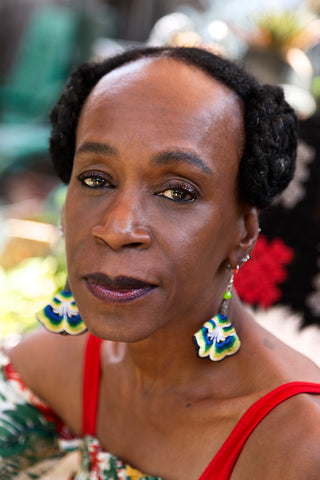
“We all are in some form of bondage” says Sana, “my work is a reaction to free us from concepts and judgements within those boundaries.” Sana seeks to speak out, artistically, about the various systems that deny women the right to free expression and to a full reflection of their lives and bodies. “Twenty-five years ago, while I was living in Mendeland, Sierra Leone, there were these young girls, ages ten to fifteen, who would visit my hut every day. We began rituals of them combing my hair, trying on my clothing, putting on my lip-gloss. They taught me the formal greetings (in Mende), how to sit like a Mende woman, eat with my tongue, never allowing the food to touch my lips. They showed me how to cook on three rocks and wash my clothes in the river while beating them on washing stones. They taught me the birth chants and I learned, too soon, to recognize the death song. Suddenly, one morning there were no young girls in the village. They returned thirteen weeks later changed. Our ritual of sisterhood was no more. They no longer had the sparkle of wonderment in their eyes; they weren’t silly young girls any longer. They didn’t want to have anything to do with me, I could not understand, I didn’t know why. I know now, they were excised.”
Silence, 2003, ceramics and mixed media, 7.5" x 5" x 6.5"
40 Days, 1998, ceramics, 11.5" x 5" x 3"
Sisters, We were together, 2011, ceramic and mixed media, 7" x 7" x 3.5"
These sculptures are the stories of girl soldiers recruited to fight in the civil wars of their lands. Girls who dreamed of playing sports, who went to school, wove beautiful baskets and worked on the farms. Their lives were suddenly and violently taken away from them and replaced with the roles of war. Girls represent 30% of child soldiers used for fighting and other purposes and are especially vulnerable when it comes to sexual violence. Each sculpture represents a child soldier accompanied by the object she once held close, like a fond memory or a dream that was deferred by war. Perhaps she was reaching for a handmade ball or weaving a basket when armed forces invaded her village and altered her life forever. Here she is frozen in a moment of her life, which is being deconstructed by war. Yet she remembers the time when she played, dreamed and felt loved. The girls and women who held up half the sky perished before they developed into whom they dreamed of once being… simply a girl.
Girl Soldiers, I used to play sports, 2014, Ceramic mix-media, 11.5” x 5.5” x 5.5”
Girl Soldier, I wanted to dance, 2014, ceramics and mixed media, 10" x 9 "x 3"
Artist Bio:
Sana Musasama received her BA from City College of New York in 1973 and her MFA from Alfred University, New York in 1988. She was awarded the 2022 Life Honorary Membership Award and the 2018 Outstanding Achievement Award from NCECA for her years of teaching and her humanitarian work with victims of sex trafficking in Cambodia and the United States. Sana is the coordinator of the Apron Project, a sustainable entrepreneurial project for girls and young women reintegrated back into society after being forced into sex trafficking. In 2015, the Museum of Art and Design in New York selected four works from The Unspeakable Series for their private collection; Sana was awarded the ACLU of Michigan Art Prize 7 and Art Prize 8. In 2002, she was awarded Anonymous Was a Woman and in 2001, Sana was featured in the 2001 Florence Biennial. Sana lives and works in New York.






